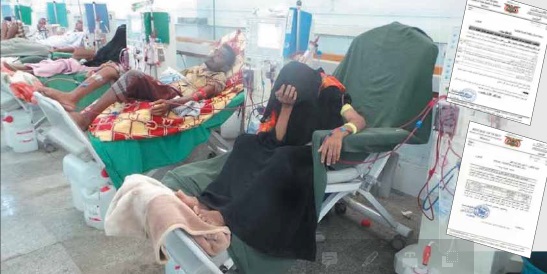Documents, presented by the Al-Masirah Arabic channel, that are official correspondences between the Ministry of Public Health in Sanaa and the World Health Organization, revealing the latter's abandonment of its responsibility towards patients with kidney failure in besieged Yemen. This makes the situation more dangerous in the coming days with the depletion of the stocks of the Ministry of Health and dialysis centers in Yemen.
“We recommend that your excellency search for alternative financing opportunities through the local authorities and address the national bodies to provide the necessary needs,” WHO said in a statement to the Ministry of Health in Sanaa on January 15, 2023.
Just like that, the World Health Organization stated that it does not have any responsibilities towards about 5,000 patients suffering from renal failure.
The Ministry of Health in Sanaa expressed it's shock by the WHO response after a year of contacts to provide medicines and dialysis solutions, noting that their delayed response did not leave them any opportunity.
The ministry in its memorandum to the World Health Organization: The organization knows that we are under siege and there are no financial resources to face that.
Dr. Ali Jahaf, Undersecretary of the Ministry of Public Health for the Therapeutic Medicine Sector, said: We have been addressing the World Health Organization for a whole year to provide medicines and solutions for dialysis sessions, and the stock has run out for the year 2023. Inventory and needs from one center to another according to preparation, and this plan allows us to hold out until next March, and after that date, will have nothing left.
A full year of official correspondence between the Ministry of Health and the World Health Organization. The first memorandum was issued on January 30, 2022, attached to a list of needs for kidney failure patients addressed to the World Health Organization.
Another memorandum was sent in February 2022, and a third memorandum in March 20, 2022, including a list of needs. A fourth was done in April 2022, and a fifth memorandum in October 2020. The last two memorandums were sent in January 2023, one of which is a warning that the stock of dialysis drugs and solutions is depleted.
Dr. Ali Jahaf adds: Our discourse with the World Health Organization was not limited to the letters that we started in January 2022, but we also held several meetings with them to demand the provision of the need for dialysis medicines and solutions and the lack of stocks for the year 2023, as well as we held a comprehensive meeting with organizations operating in Sanaa and informed them about our situation regarding dialysis stocks and the expected catastrophe if the need for dialysis sessions for patients with kidney failure is not met.
"We are in a state of siege and aggression, and the United Nations is the one to bear full human responsibility and take actions for our medical, humanitarian and other needs," he added.
Although nearly two weeks have passed since the last international distress call from Sanaa to provide dialysis sessions, the United Nations is still deafening its ears, leaving death imminent with the lives of 5,000 patients with kidney failure in besieged Yemen.
This raises an important question, if we exclude the political aspect, what is left for the United Nations to do humanitarianly in a besieged country.







